Healthcare providers, social care, patient associations, charities, non-governmental agencies and pharmaceutical companies can improve outcomes for people with diabetes, through high-quality, cost-effective treatment and management. This award recognises outstanding collaborative projects that demonstrate working with internal and external stakeholders to achieve a common goal, and significantly contribute to self-management, avoidance of complications and treatment of diabetes.
Winner
World Foods: First visual carb awareness book for BAME communities
North West London Diabetes Transformation Programme Strategy and Transformation Team
The UK has over 500 000 people from Black, Asian and Minority Ethnic (BAME) communities living with diabetes, and a greater number at risk of developing it. When information, education or advice is culturally focused, outcomes in these communities improve. BAME communities in North West London wanted dietary information relating to food they recognised and advice in a format they could easily understand, but this information was not available. A collaboration was formed between Carbs & Cals and the North West London Diabetes Sustainability and Transformation Plan to create a book for education and self-management in BAME communities.
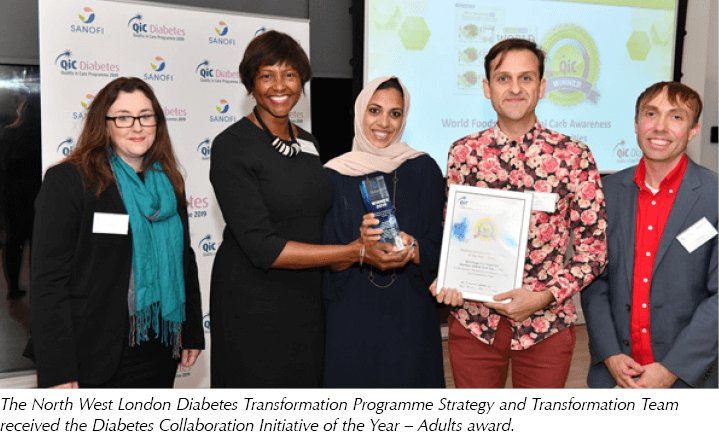
Highly commended
Seven Thousand Feet – exhibition, events and engagement
Artist Christine Wilcox-Baker, in collaboration with NIHR Clinical Research Network Greater Manchester, Salford Royal NHS Foundation Trust, Manchester NHS Foundation Trust, Manchester Metropolitan University and University of Manchester
Seven Thousand Feet was an exhibition and series of events about diabetes (causes, prevention, management and insight into patient lives). This collaborative and innovative project brought together diverse stakeholders to engage with the public in Greater Manchester about diabetes, through visual artworks and associated science exhibits and activities. The title reflected the number of people in the UK undergoing diabetes-related amputations annually, and featured 7000 single donated socks. It took place during Manchester Science Festival in October 2018, running until World Diabetes Day on 14 November. Almost 2000 members of the public and diabetes healthcare professionals saw it.
Highly commended
Diabetic Eye Disease: Building capacity to prevent blindness
London School of Hygiene and Tropical Medicine; International Centre for Eye Health
More than 75% of people with diabetes live in low- and middle-income countries, and recent global trends show an alarming increase in vision loss from diabetic retinopathy, highlighting the need to build capacity and strengthen diabetic eye health services at national levels. Diabetic eye health services in the NHS offer a health-systems approach for the prevention of vision loss. This initiative aimed to share evidence and good practice for the prevention of visual loss from diabetic eye diseases globally, via the open online course Diabetic Eye Disease, for healthcare professionals around the world working in local diabetes services.
This award recognises people and teams who have previously been recognised within QiC Diabetes. Qualifying initiatives have successfully disseminated and sustained best practice for a minimum period of two years, for the ultimate benefit of people with diabetes and/or their families and carers.
Winner
Sustaining quality improvement and patient outcomes in North West London
North West London Health and Care Partnership
The North West London Diabetes Improvement Programme began in 2014 in five Clinical Commissioning Groups and has now spread to eight. It has achieved continued quality improvement in key diabetes metrics. The programme provides ongoing clinician education, including 10-point training in secondary care. The Know Diabetes information and support service is about to relaunch, providing a single point of referral, diabetes education and multi-channel campaigns to all patients with diabetes and non-diabetic hyperglycaemia in North West London. Outcomes include an 8% reduction in diabetes foot admissions in 2018/19 and reductions in myocardial infarction, acute kidney injury and renal failure.

Highly commended
Carbs & Cals books, app and teaching resources
Carbs & Cals/Chello Publishing Ltd
Carbs & Cals specialises in books and apps for diabetes, weight loss, portion control and healthy eating, using thousands of food photos to help count carbohydrates and calories. It has been nationally recognised as the leading carb-counting resource for type 1 diabetes for nine years running. Since winning the QiC Award in 2014, Carbs & Cals has published 10 additional books, including resources for type 2 diabetes, weight loss and gestational diabetes, plus specific resources for black and minority ethnic communities. The self-funding project has worked with a variety of partners and research projects to help people self-manage their diabetes and other conditions.
This award recognises initiatives to advance the skills and knowledge of healthcare professionals to support effective and efficient management of people with diabetes.
Winner
Digital safety training improving ward staff insulin competency and confidence
Cambridge Diabetes Education Programme
Most hospital inpatients with diabetes are admitted to hospital for non-diabetes-related reasons and are cared for by non-specialist teams. Suboptimal hospital management of diabetes can lead to increased length of stay and increased morbidity and mortality rates. Delivering measurable and standardised insulin safety training is challenging, as shifts are busy, often understaffed and rely on agency or bank nurses. Cambridge Diabetes Education Programme collaborated with Dr Sam Rice, Chris Cottrell and PocketMedic to create a “bite-sized” educational film and competency-based e-learning topic to support ward staff.

Highly commended
“COMPLEMENT” (Complete Mentoring and Diabetes Education for Clinically Practising Pharmacists)
EDEN Leicester Diabetes Centre, Leicester General Hospital
This initiative was designed to meet a need in primary care to rapidly upskill clinical pharmacists to be able to give complete care to people living with diabetes. Prescribing clinical pharmacists are a valuable asset, alleviating the burden on GP practices and providing appointments for patients to have face-to-face, quality time with a healthcare professional. However, according to EDEN’s training needs analysis, many want further training and mentorship before offering diabetes care. The COMPLEMENT programme was developed to meet this need.
This category recognises initiatives that deliver emotional wellbeing support for people with diabetes of all ages and/or their families and carers. Initiatives are not limited to people with “diagnosable/classifiable” psychological problems.
Winner
Embedding psychotherapy within a community diabetes team
Diabetes Care for You, Sussex Community Foundation Trust
Diabetes Care For You is a community diabetes service commissioned in 2016 to provide care to two CCGs. It integrates diabetes psychotherapy and emotional support with the patient pathway and the multidisciplinary team. This includes clinical work with women with sexual dysfunction; group education for people with type 1 diabetes; and adding psychological information to a new type 2 diabetes education curriculum. An eating disorder pathway was created for people with diabulimia or binge eating disorder. Psychological assessment is available for patients requiring insulin pump therapy, and the team works with the young adult clinic team.
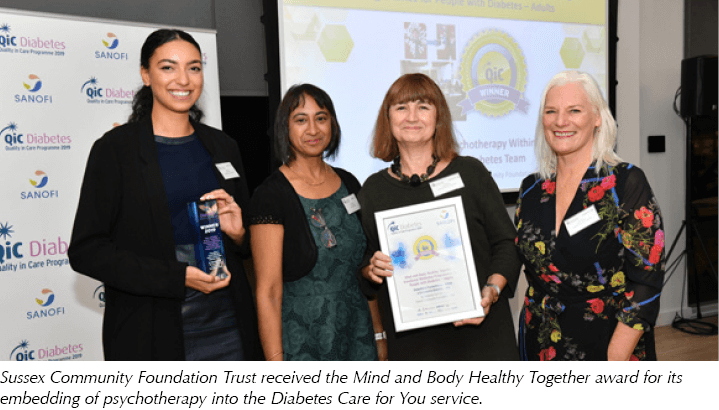
This category recognises initiatives that deliver specialist support for adults with type 1 diabetes and have demonstrated positive impact on the diagnosis and management of type 1 diabetes and associated secondary complications.
Winner
Implementation of a national guideline with local changes: Does an abbreviated adult diabetic ketoacidosis protocol improve local uptake and overall clinical care?
Sandwell and West Birmingham NHS Trust
Management of diabetic ketoacidosis (DKA) remains a significant clinical problem in hospitals. Morbidity, mortality and length of hospital stay are negatively affected unless this life-threatening condition is diagnosed and treated quickly. The Sandwell and West Birmingham NHS Trust’s junior doctors and nursing staff found the Joint British Diabetes Societies’ guidelines on DKA too lengthy and complicated, resulting in poor adherence. In August 2015, the document was abbreviated from ten to two pages. An audit in 2015–16 showed significant improvements in adherence, management outcomes, user satisfaction and length of stay, and the revised protocol became standard in the Trust.

Highly commended
Introducing flash glucose monitoring at scale with educational support
NHS Lothian
Flash glucose monitoring was introduced in the UK in 2015 but was limited to those who could purchase their own sensors. A lack of strong evidence of benefit (particularly with respect to lowering HbA1c) hindered NHS funding. Work began to highlight the threat of widening social inequalities in outcomes in people with type 1 diabetes (related to inequitable access to flash monitoring), and contributed to an evidence base for efficacy. This information secured liberal eligibility criteria for flash monitoring within the Lothian Health Board, and an educational programme ensured that 50% of the type 1 diabetes population were using NHS-funded flash monitoring within 6 months.
This award recognises initiatives to educate and empower people with diabetes and/or their families and carers to self-manage and stay as healthy as possible.
Winner
HEAL-D: A culturally-tailored T2D self-management programme for Black-British communities
King’s College London
Addressing poorer diabetes-related outcomes in Black African and Caribbean (BAC) patients is an urgent healthcare priority. Healthy Eating and Active Lifestyles for Diabetes (HEAL-D) is a type 2 diabetes self-management programme, culturally tailored to meet the needs of BAC patients. HEAL-D was developed using co-creation methods to ensure its cultural relevance and acceptability. It has been evaluated in a pilot study in primary care, showing significant improvements in HbA1c and patient quality of life, and resulting in South London commissioners adopting it for wider implementation.
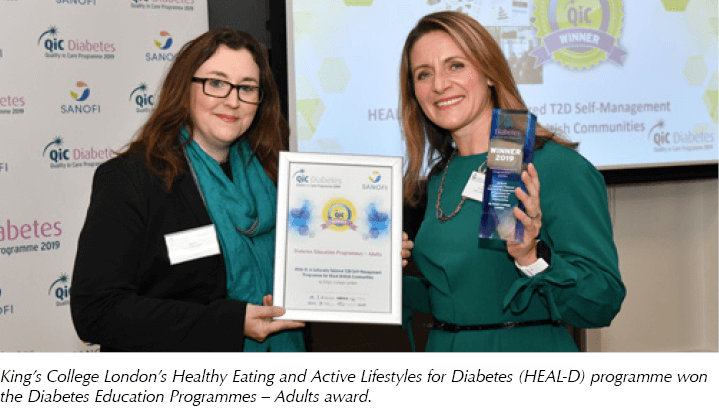
Supported by the Primary Care Diabetes Society (PCDS), this award is presented to an individual who is based in the UK or Ireland and delivers excellence in education in a specialist or community setting, whether through developing innovative teaching tools or courses; providing mentorship for other educators; or delivering and promoting externally developed training. He or she will have a clear patient focus and will be seen as a champion for education in his or her area.
Winner
Sarah Lockwood-Lee
Sarah leads on Deapp (Diabetes Education App), an integrated structured education programme for children and young people (CYP) newly diagnosed with type 1 diabetes to empower them in self-management. CYP are given Deapp to watch by a healthcare professional, who will then play with them using physical resources to check their knowledge. Sarah worked in partnership with units across the CYP’s East Midlands Diabetes Network to bring the scripts to life, and helped to design the resources and games; and with De Montfort University, who turned the ideas into animations and physical resources. Sarah is instrumental in setting up and delivering the HCP education programme, which teaches flipped learning to provide the same education in a very different mode of delivery.
Sarah is helping to roll Deapp out across the UK by already delivering training to over 80 professionals, and there has been interest from 40 countries and she is working with them to discuss international adoption. Sarah continues to develop Deapp by working with the Network to develop additional languages, a pump app, and transition and psychology sections to ensure that Deapp will remain a success.
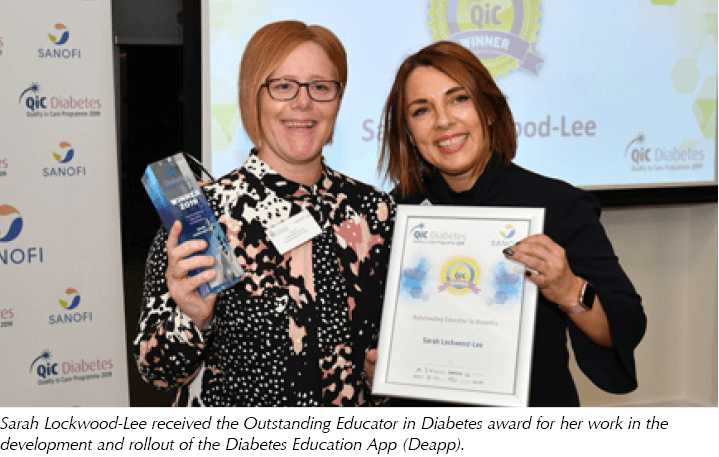
An efficient patient care pathway is critical to empower self-management and avoid unnecessary complications. Based on patient needs and goals, the focus of the patient care pathway is to improve the quality and delivery of effective integrated services that are based in the community and/or in hospital.
Winner
Telemedicine in improving care and outcomes in antenatal diabetes patients
Countess of Chester Hospital NHS Foundation Trust
NICE recommends using telemedicine, such as Skype, to assist women with diabetes in achieving their blood glucose targets. Skype allows consultations with healthcare professionals over large geographical areas, facilitating discussions related to the achievement of blood glucose levels and related issues. Using smartphone technology and mobile devices can facilitate a two-way exchange of biochemical information and advice. Skype technology was used for remote consultations with pregnant women diagnosed with gestational diabetes mellitus and examined to assess the impact on outcomes and quality of care. Projected annual savings, patient satisfaction outcomes, and clear health benefits have encouraged its continued use.
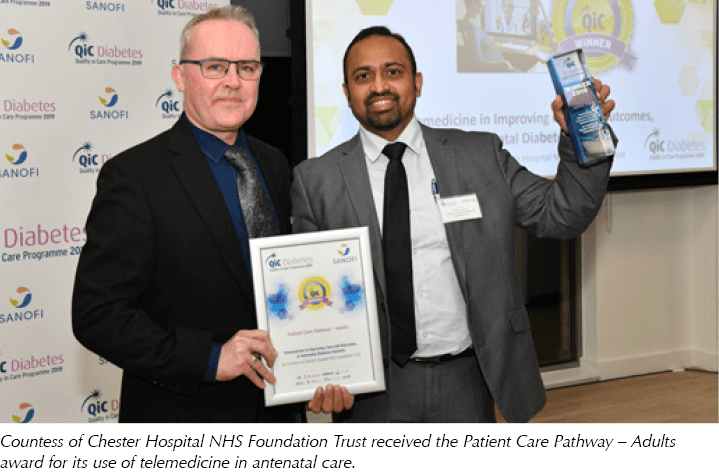
Highly commended
Supporting primary care with diabetes and chronic kidney disease management
East and North Hertfordshire NHS Trust
Diabetes and chronic kidney disease commonly co-exist and management is complex, with frequent cardiovascular, retinal, foot and bone multimorbidity and increased risks of hospitalisation. East and North Herts CCG commissioned a pilot service to identify and provide a holistic virtual review of high-risk patients. The team worked with primary care to establish 15 pillars of care. A virtual specialist diabetes consultant review was carried out on each patient, followed by case-based discussions with GP practices using Skype, to educate and upskill primary care colleagues to help manage vulnerable patients.
This award recognises diabetes healthcare professionals based in the UK or Ireland who have succeeded in raising standards of care over and above their day-to-day role, and recognises changes in practice in 2019, initiated and led by the nominee, demonstrating positive outcomes in care and clear benefits for diabetes service users and/or their families and carers.
Winner
Rachel Berrington
Rachel dedicates her role to people living with diabetes and foot care, and works above and beyond to lead change every day. As a member of the Foot In Diabetes UK committee for 9 years, a DSN for 18 years with a special interest in feet and an independent prescriber, she blends her acute role with education of healthcare practitioners across the patient pathway, incorporating multidisciplinary team, NHS and commercial partnerships to benefit people living with diabetes.
Her activities and results include setting up protocols, guidelines and pathways; leading NICE guidance on diabetic foot prevention and management; development, implementation and dissemination of training for casting with the diabetic foot nationwide; developing and delivering face-to-face and digital education for healthcare professionals and patients/carers; key part in setting up the VALS (Vascular Limb Salvage Service); and leading work on the UrgoStart pathway in the Midlands.
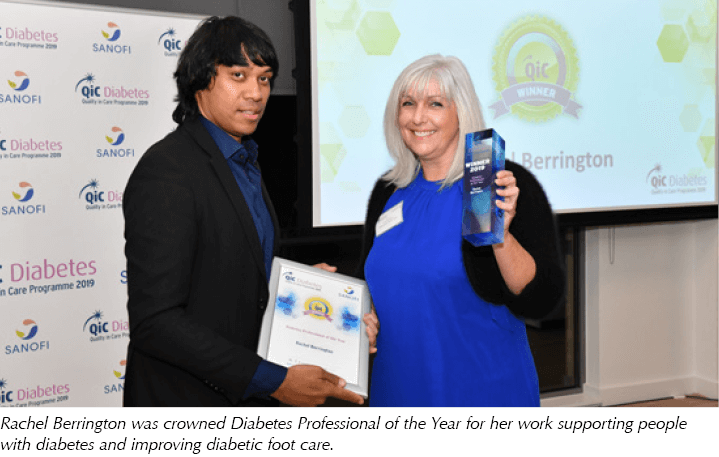
This award recognises an individual for their sterling work to improve diabetes care. NHS England are always grateful for the efforts the whole diabetes community puts forward to improve care, and this award recognises one individual for their efforts during this year.
Winner
Dr Lalantha Leelarathna
Lalantha qualified from University of Colombo, Sri Lanka, in 1998. He has a Masters in Diabetes and Endocrinology from Kings College, London, and a PhD from Cambridge University for his thesis “Improving Glucose Control and Reducing the Burden of Hypoglycaemia: Use of Novel Diabetes Technology in Type 1 Diabetes and Critical Illness. He is currently Consultant Diabetologist at Manchester University NHS Foundation Trust. His special interests include insulin pump therapy, continuous glucose monitoring, closed-loop insulin delivery, transition and type 1 diabetes. He is internationally recognised for his research in diabetes technology, with 60+ publications in leading diabetes journals.
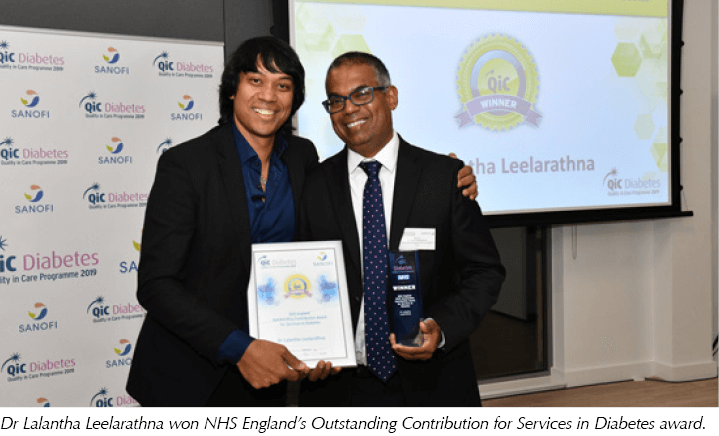
NHS Wales is very fortunate to have many dedicated and enthusiastic healthcare professionals who have championed and progressed diabetes service development. It is a pleasure to have this new award to recognise and celebrate this dedication and outstanding achievement.
Winner
Dr Sam Rice
Sam is Consultant Physician and Endocrinologist at Hywel Dda University Health Board, and Honorary Senior Lecturer at Swansea Clinical School. He has been a consultant for six years and a National Institute for Health Research Clinical Fellow from 2012 to 2015. During this time he has developed a research and innovations portfolio focused predominantly on patient support and education. As part of the Diabetes UK Clinical Champion position, he will look to develop this work further and propagate successful programmes. Projects are underway to evaluate the effectiveness of text-messaging patient support, the impact of prescribed film content on self-management skills and the ability of expert patients to deliver courses for those newly diagnosed.
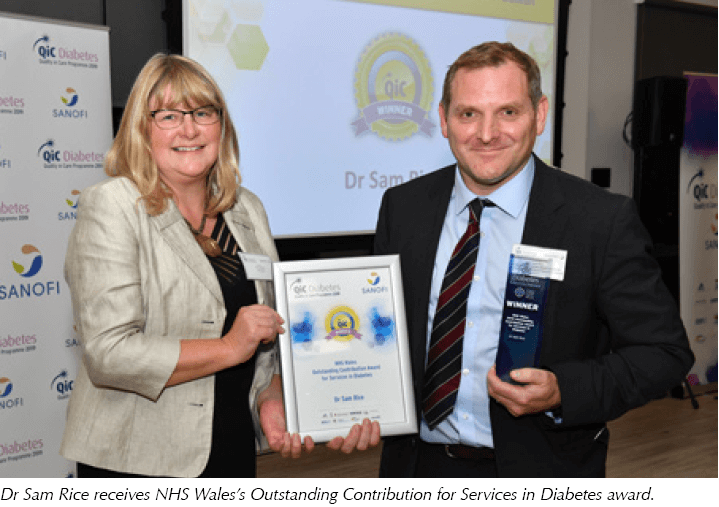
This is a special award, supported by Diabetes UK, which recognises someone very special who has supported/cared for people with diabetes in 2019.
Winner
Stefan Haest
A champion for peer support, Stefan was diagnosed with type 1 diabetes at the age of 11 years. From the beginning, Stefan committed to help other children and young people with the condition. Throughout his adolescent years and now as a young man aged 25 years, Stefan has volunteered tirelessly to support the teaching programmes run by the Oxfordshire Paediatric Diabetes Team. When he is not studying or working, Stefan has attended a variety of teaching/study days for families to offer practical support, to give a young person’s perspective and to offer peer support.

Teamwork plays a critical and growing role in high-quality diabetes care. This award recognises the value of outstanding multidisciplinary team achievements and contributions that help better prevent, diagnose or treat diabetes and support self-care management to improve the experience and outcomes for adults, children, young people and emerging adults with diabetes and/or their families and carers.
Winner
Personalised SMS care plan for diabetes
West Green Surgery
West Green Surgery wanted to improve the identification and management of diabetes and hypertension in its patients. In November 2017, it had a National Diabetes Audit achievement rate of 37%, and 28% of patients had poorly controlled hypertension. Software was developed that recalled patients more efficiently while educating them about their results. It analysed the disease registers and sent personalised messages to patients informing them of their health values, urging medication compliance, providing links to health information or directing them to make an appointment. Patients have become more empowered with their health data and more actively engaged in their health management.
Highly commended
Diabetes Technology Network UK
Association of British Clinical Diabetologists
The Diabetes Technology Network UK (DTN-UK) launched in 2016. Led by Dr Emma Wilmot, the team has delivered initiatives to improve access to diabetes technology, 11 educational meetings (2016–19), three national clinical best practice guides, three online webinars (953 registrations, >1500 views) and 13 online modules for people living with diabetes and their healthcare professionals. DTN-UK has over 500 members and 1384 followers on Twitter. It campaigned for better access to flash glucose monitoring, developed the FreeStyle Libre national audit and the 2018 national type 1 diabetes service-level audit, and helped to develop the NHS England/Diabetes UK technology pathway.
The Judges’ Special Award (not enterable directly) is judged from all entries received, irrespective of category, for a project that the judges feel deserves national recognition and a platform to be shared with the wider diabetes community.
Winner
Diabetes Technology Network UK
Association of British Clinical Diabetologists
See Diabetes Team of the Year for description.
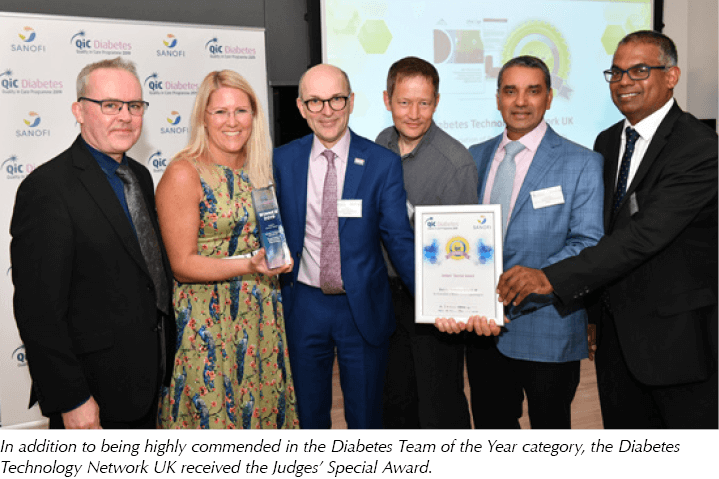
Insulin Safety Week and Hypo Awareness Week are two separate seven-day awareness campaigns that are staged annually in an attempt to reduce incidents of insulin errors and hypoglycaemic episodes in hospitals.
This year, 525 sites, mainly hospitals, participated in the Insulin Safety Week awareness campaign from 20–26 May in an attempt to reduce incidents of insulin errors. More recently, another 636 sites, made up of hospitals and medical centres across the country, took part in the Hypo Awareness Week campaign between 30 September and 6 October.
Resources, including leaflets, guidelines and educational resources, are used to help spread the word. Both programmes are organised by Orange Juice Communications and sponsored by Sanofi and GlucoRx who have no input into any arrangements or content.
The North West Anglia NHS Foundation Trust impressed judges with their “Diabetes and Insulin” pocket guide, which was handed out to more than 800 staff across the Trust to win the Insulin Safety Week Excellence award. The work of Leeds Teaching Hospitals NHS Trust was highly commended, and University Hospitals Birmingham NHS Trust, University Hospitals Coventry and Warwickshire NHS Trust and University Hospital of Derby and Burton NHS Foundation Trust (Royal Derby Hospital), were all commended for their efforts to promote the week and a make a difference.
It was Cambridge University Hospitals NHS Foundation Trust’s campaign, which included a slogan, study and videos, that scooped the Hypo Awareness Week Excellence award. The campaign by Worcestershire Health and Care NHS Trust was highly commended and other campaigns by Medway NHS Foundation Trust, University Hospitals Birmingham NHS Trust and Wye Valley NHS Trust (Hereford County Hospital) were commended.
Since Hypo Awareness Week was launched in 2012, the prevalence of all hypoglycaemic episodes in hospitals has decreased from 26% in 2011 to 18% in 2017, according to the National Diabetes Inpatient Audit data.


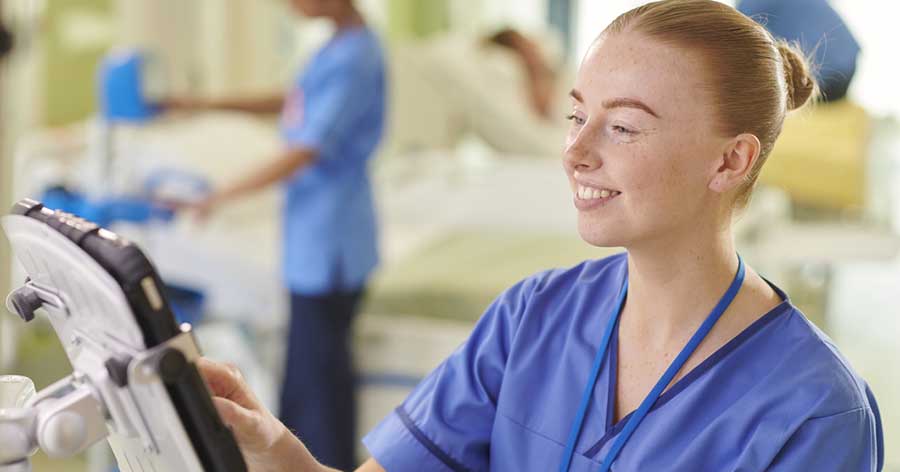

Carefully selected highlights of the recent EASD 2025 meeting.
24 Sep 2025